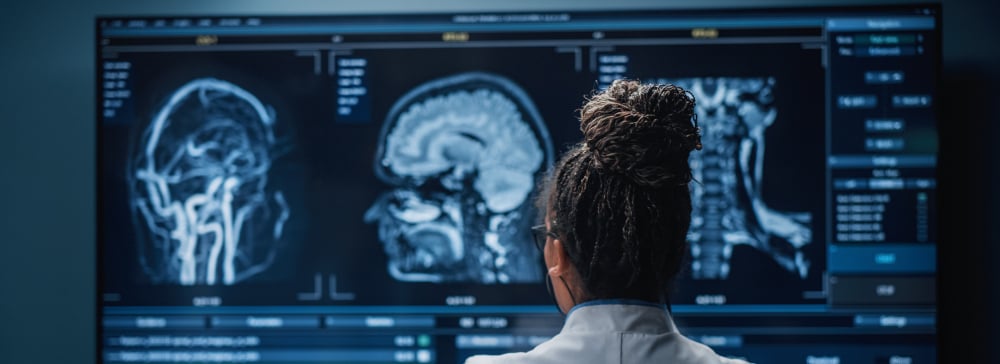Table of Contents

If you or a loved one has experienced a traumatic brain injury (TBI) as a result of an accident or other dangerous circumstances caused by another party’s negligence, you may be entitled to compensation for your medical bills, ongoing rehabilitation and therapies, lost wages from time missed at work, lost earning capacity if you are permanently incapacitated, and more.
Contact the Fort Lauderdale brain injury attorneys at Kogan & DiSalvo for a free consultation. We can investigate your case, identify all potentially liable parties, and calculate the full extent of the damages – past, present, and future – that you are owed, backed by expert witnesses in the medical profession and forensic accounting. The last things you or your family need to deal with while you’re recovering from TBI are financial worries and civil litigation. That is why our law firm takes the burden of a lawsuit off your shoulders, guiding you every step of the way and offering total transparency as we fight for your rights and the damages you deserve.
Our exclusive focus on personal injury law gives us the experience and skills to provide knowledge, insight, and, most importantly, context to understand when a settlement or lawsuit is right for you.

A traumatic brain injury is a serious injury to the brain that typically results from a violent blow or jolt to the head, and can involve an object such as part of a car, bicycle, or skull fragment going through the brain tissue.
This can cause injuries that vary widely in severity. Mild traumatic brain injuries (TBIs) such as a mild concussion affect brain cells temporarily. More severe TBIs can lead to bruising, torn brain tissue, bleeding, and other issues that can be life-altering for victims and their families.
This can lead to sudden, catastrophic changes that range from abrupt changes in personality to sudden and permanent disabilities, drastically affecting one’s lifestyle and lifetime earning capacity. Financial insecurity can follow an accident, forcing a family already in crisis to face an intimidating number of medical bills and conditions that will require costly life-long care.

While the facts surrounding each TBI are unique, such as the age, health condition, and susceptibility of the victim, there are several different types of TBIs, each with its own resulting issues. These include:
These are just the most common injuries for the brain, and other head injuries can include fractured vertebrae, pinched nerves, damaged disks, damaged or even severed spinal cords, and a host of other brain and spinal injuries.

According to the Center for Disease Control’s (CDC) report to Congress, an estimated 1.5 million Americans sustain a TBI every year. In their report, the CDC found that, as a direct consequence of these injuries, 230,000 people are hospitalized and survive, 50,000 people die, and 80,000 – 90,000 people experience a long-term disability.
Clearly, if you are suffering from the symptoms of a TBI, you are not alone.

TBIs are unfortunately fairly common and come from many different types of injurious events. Some of the most common causes are:
This is only a partial list of the most common causes, and there are many different ways an individual can receive a TBI that would qualify them to file a personal injury lawsuit.

A patient with a TBI will often be evaluated by the Glasgow Coma Scale (GCS). The GSC is the most commonly used scoring system to describe the level of consciousness in a victim of a TBI to gauge the severity of the injury. It is reliable, simple, and typically correlates well with the outcome after a TBI. It utilizes objective rating scales and measures the victim’s consciousness initially and subsequently.
This scale measures:

The symptoms of a TBI have an extensive range. Some of the more severe symptoms are a challenge for victims and families to cope with, often necessitating long-term medical treatment and lifestyle adjustments.
For a mild TBI, physical symptoms can include:
In addition to a worsening of the above symptoms, moderate to severe TBIs can include:
If you or a loved one are suffering these symptoms after an accident, seek immediate medical care, and then contact an attorney. These injuries and symptoms can last a lifetime and, while medical assistance is available, the financial burden should not fall on the victim.
If you have medical bills from an accident, contact our Fort Lauderdale brain injury attorneys. We only practice personal injury law and have years of experience obtaining maximum compensation for individuals and families struggling to navigate these significant, abrupt challenges.

Head trauma has short-term effects that can immediately be observed in a victim; however, the long-term effects can be just as devastating. These effects are often progressive, with individuals suffering several TBIs being put at even higher risk. While some patients can seem to have fully recovered, permanent symptoms and disabilities may arise later.
The long-term effects of a TBI will depend on the circumstances of the injury and individual, such as where in the brain it took place and if there were previous TBIs. For example, the frontal lobe regulates reasoning, judgment, problem-solving, planning, and impulse control. Should this be damaged by an accident involving trauma to this region behind the forehead, the victim may start engaging in risky behaviors or exhibit inappropriate behaviors that they had not previously.
Similarly, damage to the left side of the brain can cause difficulty with logic and speech, such as understanding others or being understood while talking. Damage to the right side of the brain, meanwhile, can cause an inability to perform regular or familiar tasks (apraxia) or process visual information. If this TBI victim already had a history of TBIs, such as from a long boxing career or a fall from a motorcycle, the damage will be worse than if they had never received a TBI before.
The long-term effects of TBIs include:

Serious brain injuries can often be challenging to treat, as they involve not only the immediate symptoms of the initial injury, but potentially long-term effects that can persist for years (or which may not arise until months or years after the initial injury) and cause long-term changes in lifestyle and career.
For a mild TBI, often the treatment is rest and over-the-counter treatments like pain relievers to treat headaches. However, even those with mild TBIs must be closely monitored to ensure that the symptoms do not worsen.
For moderate to severe TBIs, immediate emergency medical care is typically required. This includes ensuring that the patient has enough oxygen and blood supply, maintaining blood pressure, and taking measures like immobilization to prevent complicating any head or neck injuries. Treatment for these injuries will often include medications and other steps to reduce inflammation.
These medications include:
Moderate to severe TBIs can require surgery to heal. This can include:

Many with a TBI will experience symptoms that include the loss of skills, coordination, and other functions that victims may not have known could stem from TBIs. Rehabilitation is often available for individuals to relearn basic skills like walking and talking. This can begin in a hospital through inpatient rehabilitation, outpatient therapy, or a residential treatment facility. The rehabilitation regime will vary according to the nature of the disability.
Rehabilitative treatment can include working with specialists such as a:
The above is an overview; however, an individual case may require particular specialists depending on their injuries and circumstances. This can be a financial burden for individuals and families faced with lost wages and challenging recoveries, which is why it is important to seek insurance coverage and other compensation that can help early on. Should you feel overwhelmed by dealing with insurance after an accident in Southeast Florida, a Fort Lauderdale traumatic brain injury attorney can help.

If you or a loved one are suffering after a TBI, you may be entitled to a significant financial settlement or judgment that can help you receive treatment, offer compensation for your pain and suffering, and hold the at-fault party responsible.
The details of what remedies will be available will depend on how the TBI occurred. TBIs are often a result of negligence, and redressing this can include going through insurance in the case of a car accident or a fall on someone else’s property. This can also include filing a lawsuit if the settlement offered will not be sufficient.
In the event of an injury stemming from a car accident, Florida is a “no-fault” jurisdiction. This means that an injured party must first go through their personal injury protection (PIP) benefits, which are typically $10,000. If this is not sufficient, the injured party will need to secure a settlement from the at-fault motorist’s insurance. Speaking with an attorney before contacting the opposing party’s insurance is a good idea. Insurance companies often offer a fast settlement that will not fully cover injuries or provide adequate long-term care.
Should this not provide a satisfactory settlement, the next step may be litigation in a negligence lawsuit. This will involve proving that the negligent party owed a duty to the injured party, that they violated that duty, and that this violation of duty caused the injury.
In the tragic event of a fatality caused by a TBI, the survivors of the victim will often have the option of filing a wrongful death claim. A wrongful death lawsuit is designed to provide recuperation of the damages suffered by family members from their loss. This can help with the lingering financial issues left by the accident, as well as provide for the long-term needs of family members.
Settling with an insurance company or filing a negligence or wrongful death lawsuit all require gathering and organizing evidence for submission. Further complicating matters is the fact that Florida is a “comparative negligence” jurisdiction. This means that damages will be reduced by the amount of fault a party bears for their injury.
This makes the initial process of gathering evidence immediately following the accident and following up with any additional investigations or medical reports all that more important. We recommend scheduling a free consultation with our Fort Lauderdale brain injury lawyers early in your case to help advise on what evidence to gather, when and how to contact an insurance company, and what sort of settlement should be pushed for to compensate for your or your family’s injuries.
The statute of limitation for negligence in Florida is generally two years from the date of the injury, meaning that the court will likely dismiss a lawsuit filed after this deadline. In the tragic event of a wrongful death lawsuit, this statute of limitations is also two years from the decedent’s death.

TBIs often result from negligence, such as distracted driving or drunk driving, creating a hazardous condition that causes a ladder to break, or any number of other incidents. As previously mentioned, Florida is a “comparative negligence” jurisdiction. This means that a plaintiff collecting damages will have them reduced by the portion of responsibility they bear, up to 50%. If the plaintiff is found to be over 51% at fault for their injuries, they are barred from recovery entirely.
Potential damages in a brain injury lawsuit can include:
In the tragic event of a fatality from a TBI, surviving family members may have the option to pursue a wrongful death lawsuit.
Under Florida law, wrongful death lawsuits require that a person or entity caused someone’s death by a wrongful act, negligence, default, or breach of contract or warranty. In a wrongful death lawsuit, the personal representative of the deceased person’s estate will have to file the claim.
The damages are a bit different than negligence lawsuits, and can include:
Similar to how every case will have unique details but typically follow a familiar pattern, the same is true of damages for negligence or wrongful death: your case is unique, but will follow the same rules, guidelines, and norms as others that a TBI attorney experienced in your jurisdiction’s courts will be able to navigate.

Personal injury cases can be complex, involving navigating claims with insurance companies and making decisions about litigation. Gathering evidence from the scene of the accident and medical experts to prove both fault and damages will be critical. Choose the brain injury lawyers Fort Lauderdale residents put their trust in when justice is on the line. We serve clients in Broward County and throughout Southeast Florida.
This can include providing guidance on how to gather evidence and what sort of medical professional will best be able to document your injuries, what offers might an insurance company make to get a quick settlement that may not cover your expenses, and at what point it makes sense to go to litigation to make sure you get the compensation that you deserve. At Kogan & DiSalvo, we offer dedicated representation and vow to fight all the way for your rights. Call today or contact us through our website to see how our personal injury lawyers can help!
If you are injured and unable to come to us,
our attorney will come to you - there is no charge for us to do so.